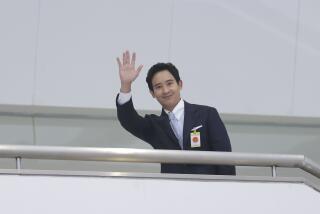Burmese Party Formed Under Ex-Premier Nu
- Share via
BANGKOK, Thailand — Burma’s political elders, in a surprise move to promote democracy in the country’s grass-roots rebellion, formed an opposition party Monday under the patronage of 81-year-old former Prime Minister U Nu.
Spokesman Khaung Nyunt told reporters in Rangoon that the new alliance will join the struggle for a multiparty political system but is not intended as an alternative to the beleaguered government.
At the same time, student-led demonstrations continued in Rangoon, demanding that the regime headed by President Maung Maung give way to an interim government.
The president, Burma’s third in little over a month, has made no public statement since Wednesday, when he pledged to call a congress of the ruling Burma Socialist Program Party on Sept. 12 to hear his plea for a referendum on a multiparty system.
Familiar Names
Khaung Nyunt, a parliamentary whip for U Nu’s party when it was overthrown by Burmese strongman Ne Win in 1962, said the new Alliance for Democracy and Peace consists of 21 members. They include former Defense Minister Tin Oo, who told a Rangoon rally Saturday that he favors an interim regime, and Mahn Win Maung, who was president in U Nu’s government. Tin Oo will be general secretary of the new party and Mahn Win Maung will be chairman.
The spokesman said dissident leader Aung Gyi and opposition figure Aung San Kyi Suu, daughter of Burma’s independence leader Aung San, will be invited to join the alliance.
Meanwhile, rumors that Ne Win had fled the country continued to sweep the capital but could not be confirmed. Ne Win, who ruled Burma with an iron fist for 26 years, resigned as party chief late last month and turned over the reins to the hated Sein Lwin. This triggered violent popular protests in which as many as 1,000 people have been killed by the military, according to diplomats’ reports. Sein Lwin was replaced Aug. 19 by Maung Maung.
“The demonstrators are crying out for leaders,” a Rangoon-based diplomat said over the weekend.
Whether the new alliance, made up primarily of political elders, will fill that role is not known, but its spokesman said the group does not intend to back any particular candidate to head an interim regime. And there has been no sign that the ruling party intends to waver from its timetable for political change.
Reports from Rangoon said Burma’s rebellious ethnic minorities, who control virtually all the country’s border territories, have asked to join the alliance.
U Nu remains a respected statesman in Burma, although he was never able to form a stable, multiparty regime during his premiership after Burmese independence from Britain. U Nu led Burma from 1948 to 1958, when he gave way to a caretaker government headed by Ne Win. He returned to power in 1960.
Five years after Ne Win’s 1962 coup, U Nu went into exile, first in Thailand, where he formed a resistance movement, and then in India. He returned to Burma in 1980, pledging to abandon political activity. He has made no political statements during the present strife.
But other establishment leaders continued to speak out. On Monday, the Rangoon Bar Council declared:
“The whole country has already rejected the one-party system by the demonstrations, and procrastination by referendum . . . would only deepen the fast-deteriorating situation in the country. The Bar Council therefore demands the government form an interim government to carry on the process of democratization of the country.”
Since Maung Maung lifted martial law in Rangoon last Wednesday and pulled most military patrols off the streets of major cities, Burma has fallen into a state of confusion and lawlessness. Widespread looting has been reported in Rangoon, and neighborhoods have formed self-defense forces and erected bamboo barricades to keep cars and strangers out at night.
On Sunday, the students proclaimed the re-establishment of the Rangoon University Student Union, banned since Ne Win’s coup. Waving the “Fighting Peacock” banner of Burma’s independence fighters, the students demanded democracy and named Min Ko Naing as leader of the student movement.
In a telephone interview from his home in Laguna Hills, Calif., Kyaw Win, a top Burmese dissident in exile, called for Aung Gyi or any other acceptable leader to proclaim a provisional government in Rangoon. He said Min Ko Naing is undoubtedly a nom de guerre shielding the identity of the student leader. In the Burmese language, the name means “the man who defeated the king.”
More to Read
Sign up for Essential California
The most important California stories and recommendations in your inbox every morning.
You may occasionally receive promotional content from the Los Angeles Times.













